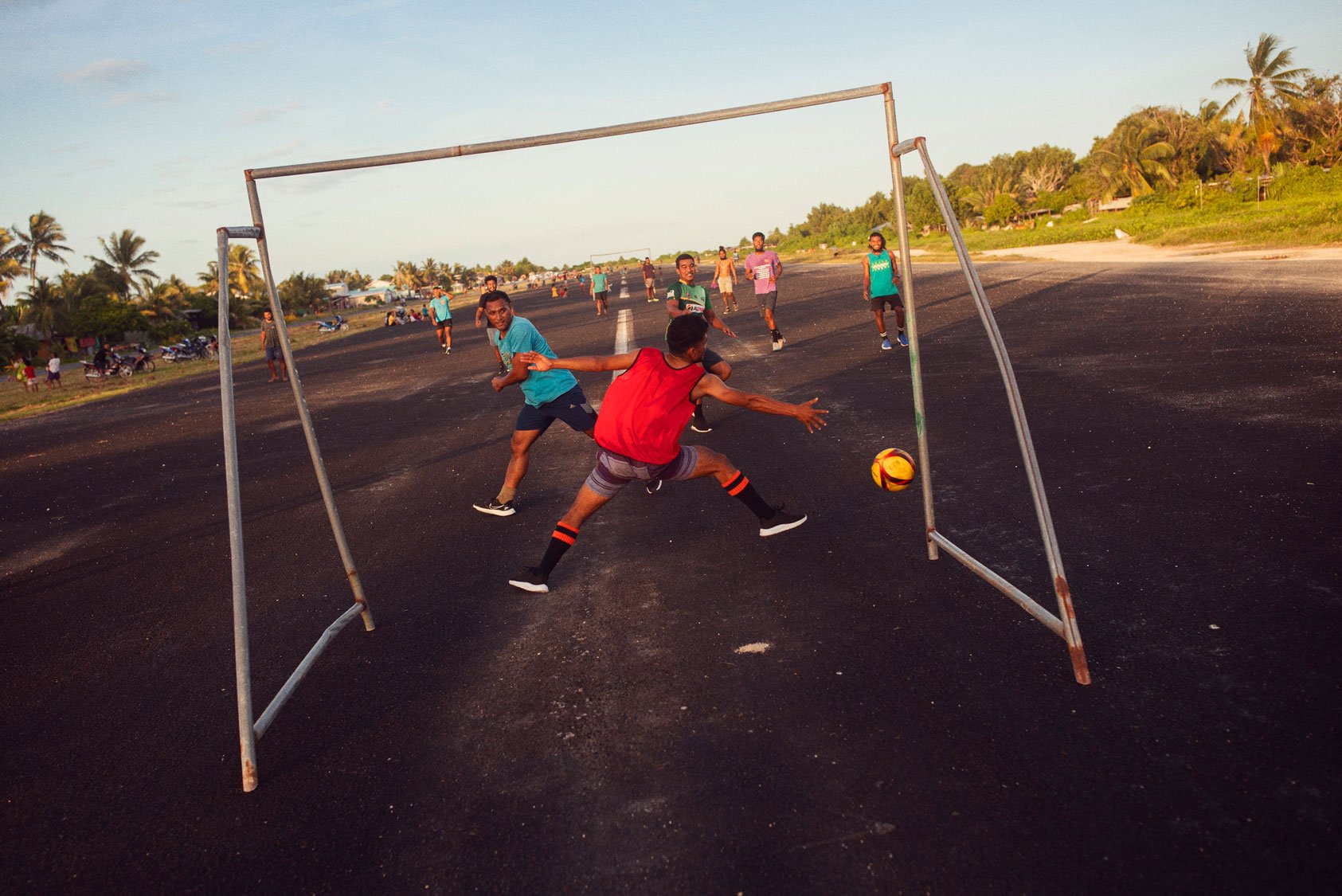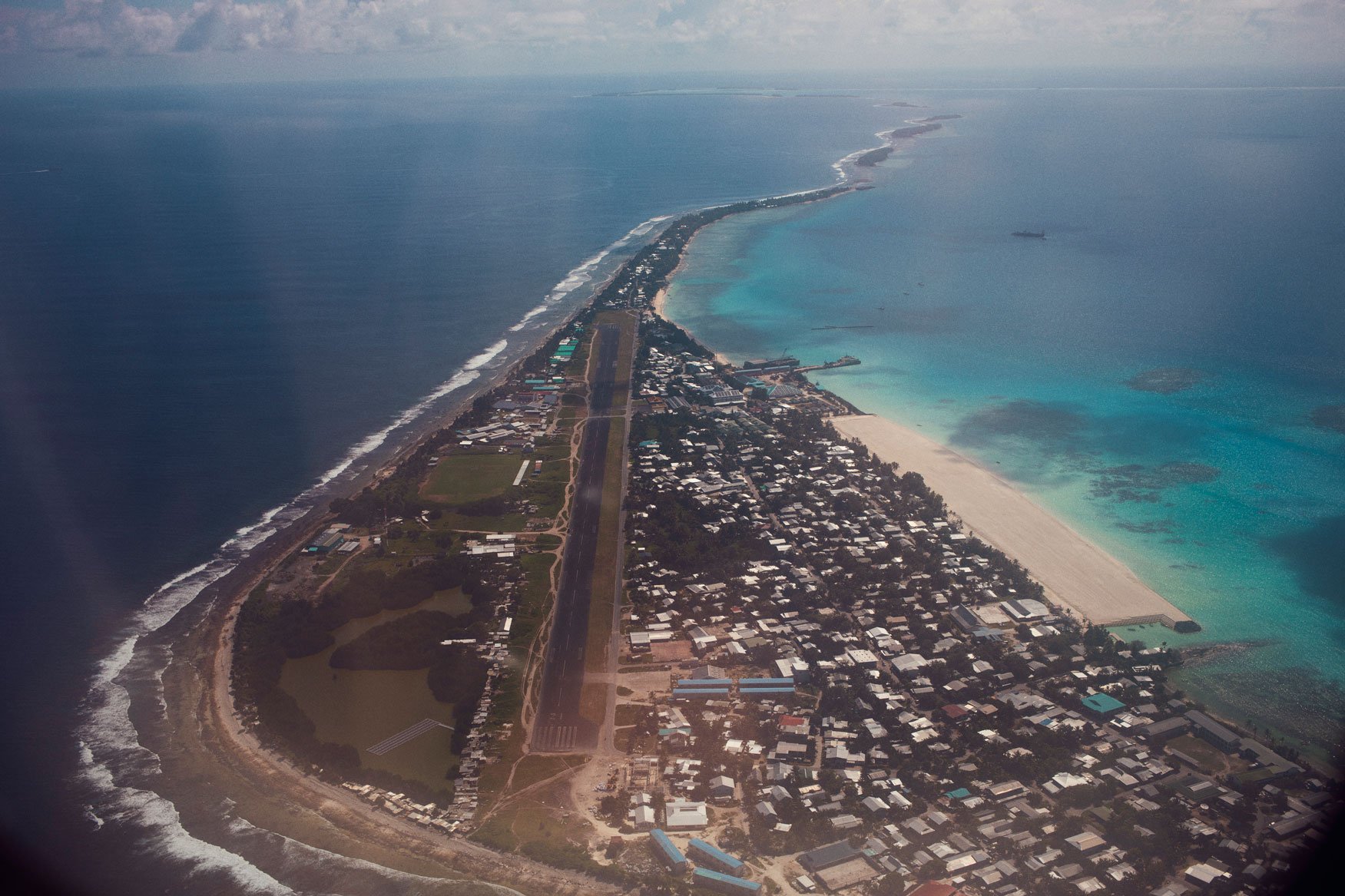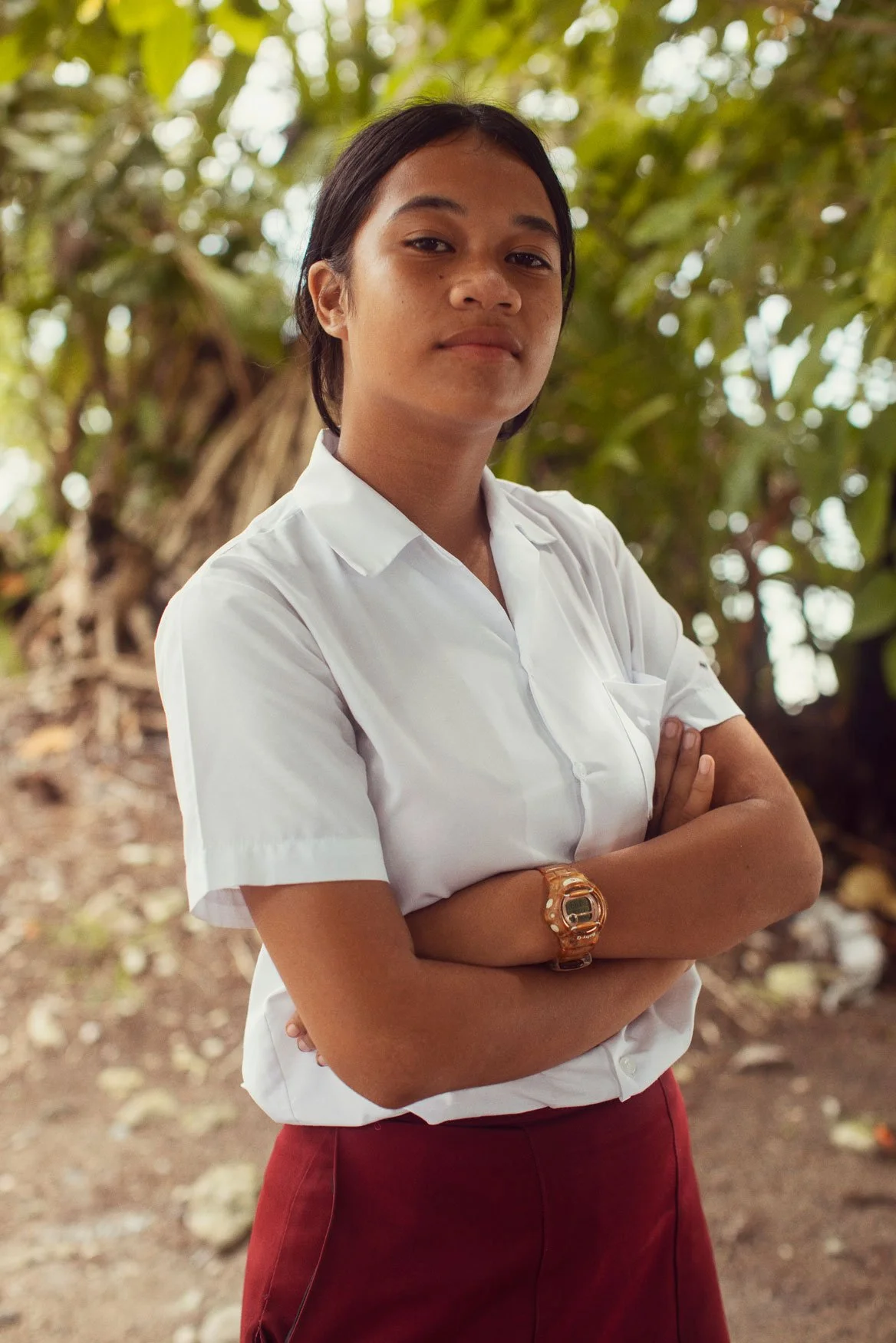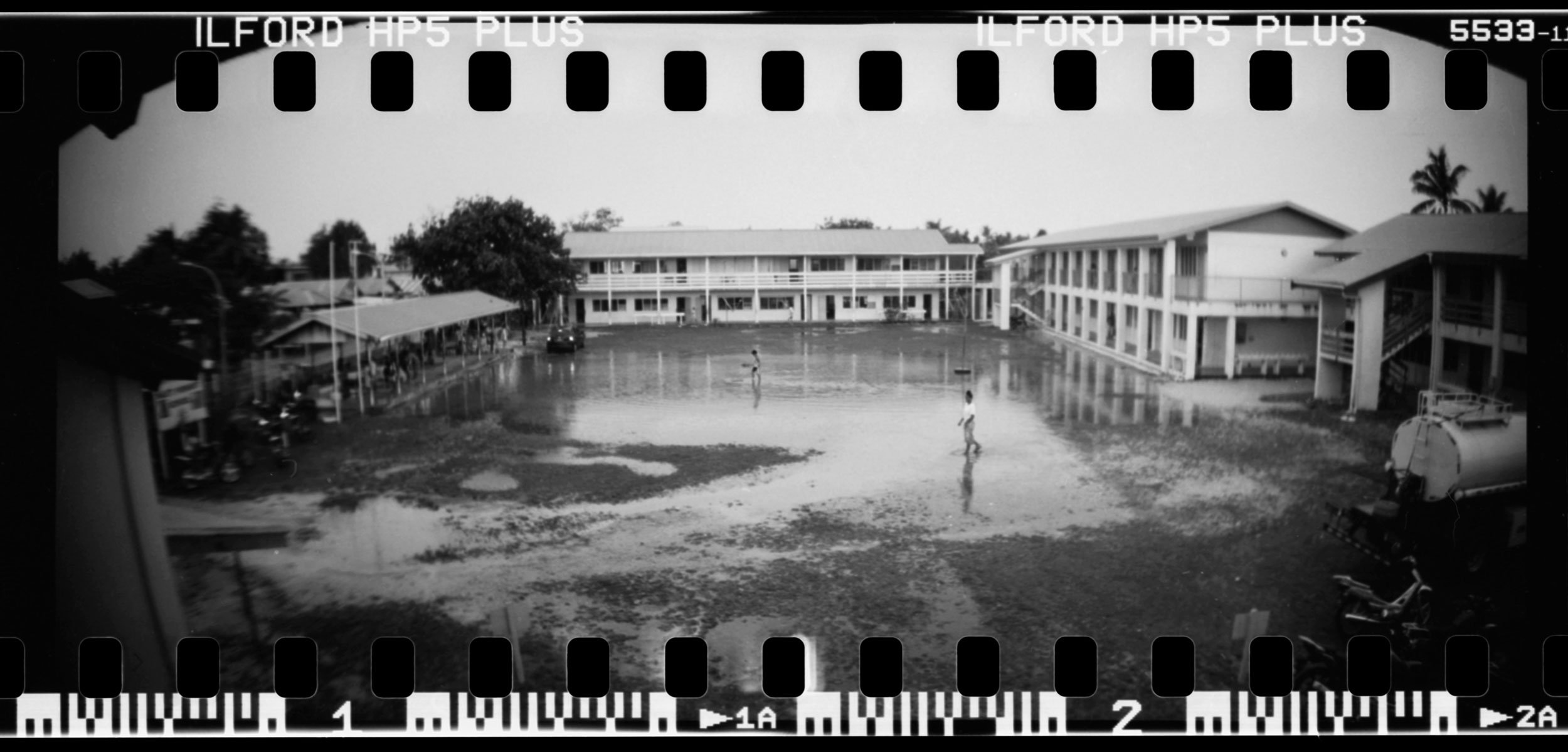The Last Generation
Scientists predict that Tuvalu will be the first country in the world to become uninhabitable due to climate change and rising sea levels. By the year 2100, 95% of the country will be submerged during high tide. However, the residents are already experiencing the consequences of rising sea levels. The sea is gradually encroaching upon the land, and erosion. Saltwater has contaminated the groundwater to such an extent that the inhabitants can no longer use it, relying instead on rainwater.
Right now, 1 billion children worldwide are living in extremely vulnerable conditions due to the climate crisis, according to figures from UNICEF. Approximately 5,000 of them live in Tuvalu.
This story was produced in collaboration with UNICEF Denmark.
The Reclaimed Land is a newly built land area covering 78,000 square meters – 100 meters wide and 780 meters long. The three sides of the land facing the sea are protected against erosion using enormous sandbags. They are meant to ensure that the sea does not devour the newly constructed land. The ground itself consists of densely packed sand and crushed corals gathered from the seabed and relocated to where it originated. The estimated lifespan of the sandbags is 50-100 years, and the Tuvaluans hope that within that time, a more permanent way to secure the landmass can be developed.
13-year-old Mono is in 8th grade at Nauti Primary School. He is convinced that he will move away one day, but like most of the children and young people in Tuvalu, it is not something he wants. He plans to stay in Tuvalu for as long as possible because he loves the lifestyle here.
“I love the sun and the warm weather here in Tuvalu. And I love that my friends are so close, and that we are so much together”
In this isolated society, internet access is extremely poor, with a slow mobile data network and no mobile phone network. Instead of entertaining themselves on screens, Tuvaluans spend their spare time being together.
Only three flights pass through Tuvalu’s international airport each week. When the planes take off, the locals take advantage of the large strip of open land. As soon as the planes are airborne, they bring out football goals on the runway and start playing football. All the way up the asphalt strip, they play rugby and volleyball. Everyday afternoon families sit on the grassy patches beside the runway with picnic baskets and homemade dinner.
In the evenings, fathers gather at The Reclaimed Land to fish for dinner for their families. There are still plenty of fish in the sea, but the locals experience fewer than before, and the fish have become smaller. Also the sea temperature is rising, causing corals to die and release a toxin that contaminates the fish. When Tuvaluans eat these poisoned fish, they fall ill, often with diarrhoea and dehydration, which in the worst cases can lead to hospitalisation. Tuvaluans have no methods to determine whether the fish they consume are healthy or diseased.
14-year-old Alaina attends Fetuvalu Secondary School, equivalent to high school. Alaina’s parents have taken the consequences of Tuvalu’s uncertain future. Three years ago, they packed up and moved to New Zealand as part of an agreement where New Zealand has committed to receiving 75 Tuvaluans each year. They still live there. But last year, the family was on vacation in Tuvalu, and as the holiday drew to a close and they had to go back, Alaina chose to stay in Tuvalu. Today she lives with her grandparents, and despite her parents’ protests, she has no intention of returning to New Zealand.
“I love being in Tuvalu. The atmosphere is very special here. We have fun, and we are much more together with each other here. In New Zealand, people live more separately and mind their own business. I think that’s too boring and lonely.”
Rising sea levels also create other problems in Tuvalu. Seawater intrusion into the land has contaminated the groundwater with salt, rendering it unusable for drinking or washing. Rainwater has become the primary source of water for the residents. Almost every house has at least one 10,000-liter water tank, and all gutters direct rainwater into tanks of this type.
James, 36, is living on the island of Funafala. He works as a carpenter, tends to a small pig herd, and spends his evenings fishing. James is one of only 50 residents living on Funafala.
“All buildings on the island are on one level. So, we have nowhere to go when we get hit by heavy storms and floods. Our best bet is to climb up a palm tree. But there we can’t have children or the elderly with us. And we also don’t know if we’ve climbed the palm that will be torn down by the storm,”
When the school day is over and household chores are done, many children gather at The Reclaimed Land. One of them is 14-year-old Frank(on the right). Alongside his friends, he spends most afternoons and evenings in front of the newly built land, playing rugby – in the water. For thousands of years, Tuvalu has been inhabited by people living in close symbiosis with the sea. But where the sea was previously only the source of life, today it has become the biggest threat to Tuvalu's existence.
One of those trying to alert the world is 24-year-old Grace Maile. During the day, she works at the World Bank’s branch in Tuvalu, but in her spare time, she advocates for the world to act as a climate activist.
“The sea keeps us alive, but at the same time, it slowly eats us up. It eats our memories and our culture bit by bit. And that scares me. Migration is a good plan, but it is a contingency plan. We do not want to leave our country and go elsewhere. Our culture and our identity are tied to this land. And everything is connected here – the land, the water, the culture, and the people who live here. That’s not something we’re willing to give up and move away from. But we need the help of the world to save Tuvalu,”
Tuvalu has a long tradition of educating sailors for the world’s large cargo ships. However, with fewer job opportunities on these ships, fewer Tuvaluans are inclined towards this career path. The maritime school, responsible for training sailors, currently has only 11 students. Despite the education being funded by the state and covering both board and lodging, interest in this career path is dwindling.
With its sparse population(11.400), Tuvalu has the world's smallest economy. However, with a total annual gross national product of just over 59 million USD, which needs to cover everything from infrastructure, healthcare, education, governance, etc., there isn't much money left to protect the country against climate change.
Tuvalu has been inhabited by people for almost 3000 years, leading a largely self-sufficient existence, highly isolated from the outside world. However, this is no longer the case. Tuvalu can no longer sustain itself and currently has a significant need for external assistance.
Published by Politiken & UNICEF




























